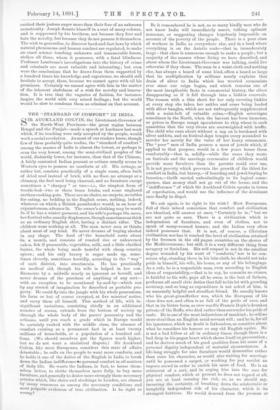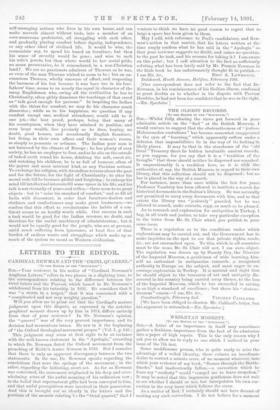THE " STANDARD OF COMFORT " IN INDIA.
SIR AUCKLAND COLVIN, the Lieutenant-Governor of the North-West Provinces—the great region between Bengal and the Punjab—made a speech at Lucknow last week which, if its teaching were only accepted by the people, would work a social revolution. As most of our readers know, though flew of them probably quite realise, the " standard of comfort " among the masses of India is almost the lowest, or perhaps is even the very lowest, among the semi-civilised peoples of the world, distinctly lower, for instance, than that of the Chinese. A fairly contented Indian peasant or artisan usually seems to Western eyes to possess no comforts at all. His cottage, or rather hut, consists practically of a single room, often built -of dried mud instead of brick, with no floor, no attempt at a -chimney, the fuel used being charcoal, and no furniture except sometimes a " charpoy " or two—i.e., the simplest form of trestle-bed—two or three brass lotahs, and some unglazed earthen cooking-pots. There are no chairs, no carpets, no tables for eating, no bedding in the English sense, nothing, indeed, whatever on which a British pawnbroker would, in an hour of expansiveness, advance 3s. The owner's clothing may be worth .58. if he has a winter garment, and his wife's perhaps 10s. more, her festival robe, usually diaphonous, though sometimes as thick as an ordinary English shirt, having a distinct value. The children wear nothing at all. The man never sees or thinks about meat of any kind. He never dreams of buying alcohol in any shape. The food of the household costs about the. a month, and consists of roasted rice or unleavened cakes, fish if procurable, vegetables, milk, and a little clarified butter, the whole being made tasteful with cheap country spices ; and his only luxury is sugar made up, some- times cleverly, sometimes horridly, according to the "way" -of each district, into sweetmeats. He has practically no medical aid, though his wife is helped in her con- finements by a midwife nearly as ignorant as herself, and never dreams of the purchase of anything of any sort— 'with an exception to be mentioned by-and-by—which can ilay any stretch of imagination be described as portable pro- perty. He could fly into the jungle with his whole possessions, his farm or but of course excepted, at five minutes' notice, and carry them all himself. This method of life, with in- significant variations, consisting chiefly in an additional number of rooms, extends from the bottom of society up through the whole body of the poorer peasantry and the artisans, until you reach a grade which in Europe would be certainly ranked with the middle class, the absence of ',comfort existing as a permanent fact in at least twenty millions of households, or a population of a hundred mil- llions. (We should ourselves put the figures much higher, but we do not want a statistical dispute.) Sir Auckland (Colvin, like most Europeans, considers this state of affairs ,detestable ; he calls on the people to want more comforts, and he holds it one of the duties of the English in India to break down the Indian indifference 4o personal comfort in all matters of daily life. He wants the Indians, in fact, to house them- selves better, to clothe themselves more fully, to buy more furniture, and generally to desire more strongly those necessary articles which, like shoes and stockings in London, are classed by many reasoners as among the necessary conditions and most palpable evidences of true civilisation. Is he right or
wrong? Be it remembered he is not, as so many kindly men who do not know India will immediately assert, talking optimist nonsense, or suggesting changes hopelessly impossible on account of the poverty of the people. There is a poor class of workers in India as everywhere else, and in a land where everything is on the Asiatic scale—that is, immoderately large—that class is numerous enough to make a people ; but a majority of the masses whose living we have described, and about whom the Lieutenant-Governor was talking, could live otherwise if they chose. The man in a waist-cloth and nothing else, has always a hoard of some kind, often a hoard so large that its multiplication by millions nearly explains that drain of silver to India which has worried economists ever since our reign began, and which remains one of the most inexplicable facts in commercial history, the silver disappearing as if it fell through into a hidden reservoir. The woman with a thin sheet for her only covering tinkles at every step she takes, her ankles and arms being loaded with silver bangles, which are not unfrequently supplemented with a waist-belt of valuable ooins,—English sovereigns sometimes in the North, when the harvest has been immense, or prices in Europe tempt speculators to ship wheat in such quantities that the very rivers are overweighted with traffic. The child who runs about without a rag on is burdened with silver anklets, and on festival-days tempts every scoundrel to murder her merely for the value of her heavy ornaments. The "poor" men of India possess a mass of jewels which, if applied to that purpose, would in a few years house them comfortably—that is, solidly—while the sums they waste on festivals and the marriage ceremonies of children would provide more furniture than the parents could ever use. It is not poverty which prevents the growth of the thirst for comfort in India, but luxury,--if hoarding and jewel-buying be luxuries,—thrift carried unhesitatingly to its logical conse- quence, that money shall not go out of the house, and the " indifference " of which Sir Auckland Colvin speaks in terms of reprobation, and would use the influence of the dominant race finally to dispel.
We ask again, is he right in his wish P Most Europeans, full of their inbred conviction that comfort and civilisation are identical, will answer at once, " Certainly he is ; " but we are not quite so sure. There is a civilisation which is independent of furniture, and even of clothes, not to speak of many-roomed houses ; and the Indian very often indeed possesses that. It is not, of course, a Christian civilisation; nor has it reached the level of civilisation attained by the freemen in the old pagan countries on the shores of the Mediterranean; but still, it is a very different thing from savagery or Socialism, His self-respect is not in the smallest degree wounded by his want of " comforts," nor is he con- scious why, standing there in his loin-cloth, he should not take pride in himself, his wife, his home, or any of his belongings. As a rule, he is a respectable man, even according to English ideas of respectability,—that is to say, he commits no crimes, is faithful to his wife, pays all he owes, is the best of fathers, performs all small civic duties that fall to his lot with growling accuracy, and so long as expenditure is not asked of him, is an unusually helpful and steadfast friend. He usually knows who his great-grandfather was, which the European of his class does not, and often is as full of the pride of race, and that in its Wetter form, as ever was Sir Francis Doyle's drunken private of the Buffs, who died rather than surrender his pride of caste. He is one of the most industrious of mankind ; he will no more steal than an English maid-servant will ; and he is, for all his ignorance, which no doubt is fathomless, as sensitive about what he considers his honour as any old English squire. He is not a bad fellow at all in ordinary times, though there is bad drop in his pagan heart which shows itself on provocation; and he derives much of his good qualities from his sense of a personal dignity independent of material circumstances. A life-long struggle for nice furniture would demoralise rather than raise his character, as would also waiting for marriage until he possessed a carpet, or working for pay amidst an impure crowd in order to enrich his mess of food. He is an aristocrat of a sort, and in urging him into the race for physical comfort, which at present he does not regard at all, you are at least running the risk, or, as we should say, incurring the certainty, of breaking down the aristocratic or haughtily independent side of his character, which is its strongest buttress. He would descend from the yeoman or self-managing artisan who lives in his own house, and can make marvels almost without tools, into a member of an over-numerous proletariat, all struggling with each other, and gradually placing comfort before dignity, independence, or any other ideal of civilised life. It would be wise, the economists say, to spend his hoard on furniture, but then his sense of security would be gone ; and wise to melt his wife's jewels, but then where would be her social pride, no mean preservative, be it remembered, in a non-Christian land P We are no passionate admirers of Thoreau as he was, or even of the man Thoreau wished to seem to be ; but an un- conscious Thoreau, wholly unaware of effort, and respecting the bareness of his but because it was bare too in his fore- fathers' time, seems to us nearly the equal in character of the smug Englishman who, owing all the civilisation he has to Christianity, often glibly dismisses the teachings of that creed as "talk good enough for parsons." In inspiring the Indian with the thirst for comfort, we may do his character much disservice ; while as to his happiness, we question if any comfort except one, medical attendance, would add to it one jot,—the best proof, perhaps, being that many of his countrymen, when they have attained to position, and even large wealth, live precisely as he does, buying, no doubt, good houses, and occasionally English furniture, but living, in their own offices and their women's rooms, as simply as peasants or artisans. The Indian poor man is not harassed by the climate of Europe ; he has plenty of easy society, he has no employer to fear, and as he sits on the estrade of baked earth round his house, drinking the soft, sweet air, and watching his children, he is as full of humour, often of the gayest and most satirical kind, as any Parisian artisan. To exchange his religion, with its endless terrors about the past and for the future, for the light of Christianity; to alter his moral code till he becomes pitiful and forgiving ; to enlarge his mind till intellectual interests fill some space in his life, and his talk is not eternally of pence and trifles,—these seem to us great objects : but to " raise his standard of comfort," and so fill all India with discontent, in order that furniture-dealers and clothiers and confectioners may make great businesses,—we confess that this effort to revolutionise the habits of a con- tinent seems to us hardly worth while. Our success in such a task would be good for the Indian revenue, no doubt, and therefore for the useful machinery of administration ; but it would not be equally good for the people, who are at present, amid much suffering from ignorance, at least free of that burden of endless wants and strugglings which make up so much of the system we vaunt as Western civilisation.



































 Previous page
Previous page